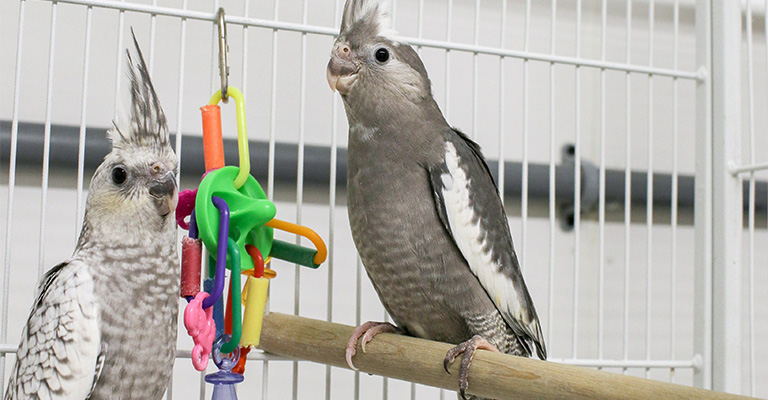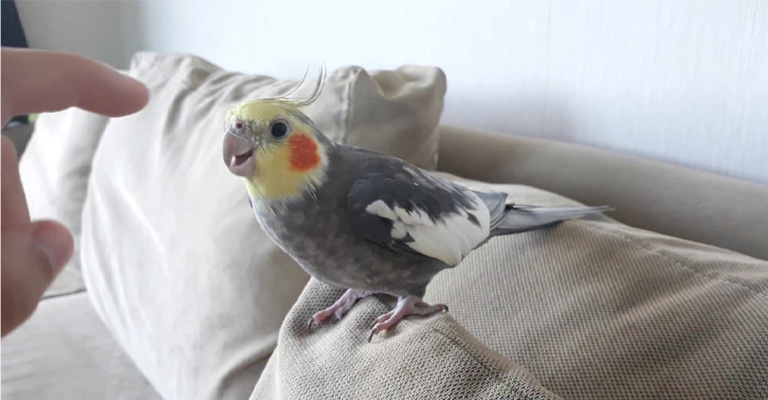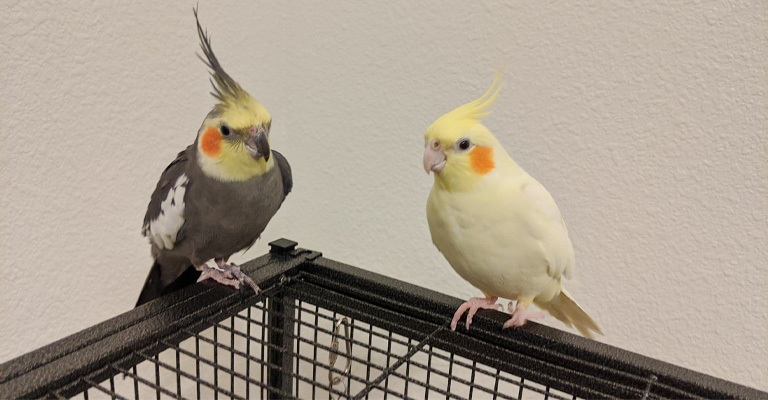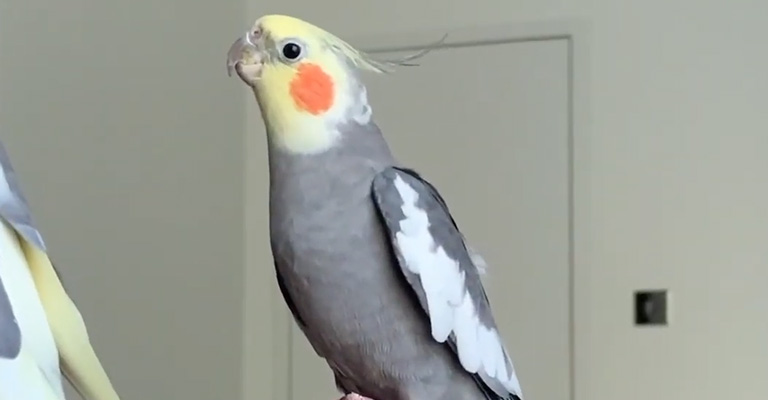Cockatiels, with their striking crests and endearing personalities, have captivated bird enthusiasts worldwide.
One of their most intriguing attributes is their ability to mimic sounds, leading many to wonder, “Can cockatiels talk?” In this blog post, we embark on a journey to explore the fascinating world of cockatiel vocalizations.
Cockatiels are known for their charming and unique vocalizations, but their speech capabilities are different from those of larger parrot species.
Understanding the nuances of teaching them to talk and the factors that influence their ability to do so can be both rewarding and enlightening.
Whether you’re a proud cockatiel owner or simply curious about these feathered chatterboxes, this post will provide insights into their talking potential.

The Natural Sounds of Cockatiels
Cockatiels are known for their charming and distinctive vocalizations. These natural sounds are how they communicate with each other and express their feelings. Here are some of the common natural sounds of cockatiels:
Whistling
Cockatiels are skilled whistlers and often use whistling as a way to communicate and interact with their owners. They can mimic various tunes and even create their own unique whistles.
Chirping
Chirping is one of the most common sounds cockatiels make. They chirp to express contentment, happiness, or just to make noise. It’s a sign that your cockatiel is feeling relaxed and comfortable.
Screeching
Cockatiels can produce loud screeching sounds when they are excited, agitated, or frightened. This is their way of expressing strong emotions or trying to get attention.
Hissing
Hissing is a warning sound that cockatiels make when they feel threatened or defensive. It’s a signal to back off and leave them alone.
Purring
Cockatiels can produce a soft purring sound when they are feeling particularly content and relaxed. It’s a sign that they are in a good mood and enjoying your company.
Mumbling and Talking
Some cockatiels have the ability to mimic human speech to a limited extent. They may mumble words or phrases, although their speech is not as clear as that of larger parrots.
Clicking
Cockatiels can make clicking sounds with their beaks. This is often a sign of curiosity or interest in something they are observing.
Squeaking
Baby cockatiels, or chicks, produce high-pitched squeaks when they are hungry or in need of attention. Adult cockatiels may also use squeaking sounds when they are trying to get your attention.
Grinding
Cockatiels grind their beaks to keep them in good condition. This sound is typically soft and rhythmic, and it indicates that your bird is relaxed.
Alarm Calls
Cockatiels may produce sharp, repetitive alarm calls if they sense danger or something unusual in their environment. This is their way of alerting the flock to potential threats.
It’s essential to understand these natural sounds to better communicate with and care for your cockatiel. Learning to interpret their vocalizations can help you provide them with the right level of attention, comfort, and stimulation they need for a happy and healthy life.
Can Cockatiels Talk?

Yes, cockatiels can talk, but their talking ability is limited compared to larger parrot species. Cockatiels are more renowned for their whistling and mimicking sounds than clear speech.
With patience and consistent training, some cockatiels can learn to mimic words, phrases, and simple tunes. However, their voices are often softer and less distinct than those of larger parrots.
Each cockatiel has a unique capacity for talking, and some individuals are more talkative than others. The key to teaching a cockatiel to talk is repetition and positive reinforcement.
Consistent interaction and exposure to words or phrases can encourage them to mimic human speech. While they may not achieve the extensive vocabulary of larger parrots, many cockatiels can learn a few words or phrases, adding charm and personality to their repertoire of sounds.
Cockatiels as The Mimicry Artists
Cockatiels are often hailed as mimicry artists in the avian world. These charming birds have an innate talent for mimicking sounds and tunes, showcasing their playful and vocal nature.
Their mimicry skills extend to various sounds, including whistles, tunes, and even some words and phrases. Cockatiels are adept at copying household noises like doorbells, telephone rings, and microwave beeps. They can also replicate environmental sounds, such as the chirping of other birds or the rustling of leaves.
One of their most remarkable abilities is mimicking human speech. While they may not reach the linguistic prowess of larger parrots, many cockatiels can learn to say a few words or phrases with their own unique twist. Their soft and melodious voices add a touch of whimsy to their mimicry.
Cockatiels use mimicry as a form of communication, bonding, and entertainment. Whether it’s mimicking their owners’ whistles or creating their own tunes, these feathered artists bring joy and amusement to those fortunate enough to share their company.
Do All Cockatiels Talk?

No, not all cockatiels talk. While cockatiels are known for their vocal and mimicking abilities, not every individual bird will develop the skill to talk. The capacity for talking varies among cockatiels, just as it does among other parrot species.
Several factors influence a cockatiel’s ability and inclination to talk:
Individual Variation
Each cockatiel has its own unique personality and abilities. Some may have a natural aptitude for mimicry and develop speech skills more easily, while others may not show much interest in talking.
Age
Young cockatiels are generally more receptive to learning and mimicry. If you want your cockatiel to talk, it’s often easier to start training when they are young.
Environment and Socialization
The level of interaction and exposure to human speech can significantly impact a cockatiel’s ability to talk. Birds that receive more attention and socialization are more likely to pick up speech.
Consistency in Training
Training and repetition play a crucial role in teaching a cockatiel to talk. Consistent and patient training sessions are essential for encouraging speech.
Species Variation
While cockatiels are known for their whistling and mimicry, their vocal abilities tend to be less advanced than those of larger parrot species like African greys or Amazon parrots.
It’s important to note that even if a cockatiel doesn’t talk, they can still be engaging and entertaining companions through their natural vocalizations, whistling, and playful interactions. Each bird is unique, and their personalities and talents can vary widely.
How to Train Your Cockatiel to Talk

Training a cockatiel to talk can be a rewarding and enjoyable experience, but it requires patience, consistency, and a gentle approach. Here’s a step-by-step guide on how to train your cockatiel to talk:
Choose the Right Time
Start training when your cockatiel is young, as they tend to be more receptive to learning at this age. However, older cockatiels can also learn to talk with patience and persistence.
Build a Strong Bond
Before you begin teaching speech, establish a strong bond with your cockatiel through positive interactions, socialization, and trust-building exercises. A close bond will make your bird more receptive to training.
Select Simple Words or Phrases
Begin with basic and clear words or phrases. Start with greetings like “hello” or “hi,” or use your cockatiel’s name. Keep the phrases short and easy to pronounce.
Create a Quiet Training Environment
Choose a quiet, comfortable space for training to minimize distractions. Turn off the television, radio, and other noisy appliances.
Repetition is Key
Repeat the chosen words or phrases consistently during your training sessions. Use a calm and clear tone when speaking to your bird. Repeat the words several times in a row, but don’t overdo it to avoid overwhelming your cockatiel.
Use Positive Reinforcement
Reward your cockatiel with treats, praise, and affection when they make any attempt to mimic the words or sounds correctly. Positive reinforcement encourages them to continue trying.
Be Patient
Understand that it may take weeks or even months for your cockatiel to pick up words or phrases. Some birds are quicker learners than others, so be patient and persistent.
Regular Training Sessions
Consistency is crucial. Dedicate short, daily training sessions (around 10-15 minutes) to practice speech. Too much pressure can stress your bird, so keep sessions short and enjoyable.
Imitate and Encourage
Cockatiels often mimic sounds they hear. Try imitating the words or phrases you want your cockatiel to learn, and they may be more inclined to repeat them.
Use Visual Aids
Sometimes, showing your cockatiel pictures or objects associated with the words you’re teaching can help them understand and associate the sounds with specific meanings.
Stay Positive
If your cockatiel doesn’t seem interested or doesn’t make progress, don’t get discouraged. Some birds may never talk, and that’s perfectly normal.
Be Mindful of Their Comfort
Pay attention to your cockatiel’s body language. If they seem stressed or uninterested, take a break and try again later. Training should always be a positive experience for your bird.
Remember that not all cockatiels will talk, and some may have a limited vocabulary. The goal is to create a fun and engaging learning experience for your bird while strengthening your bond.
Enjoy the journey of training your cockatiel and celebrating their accomplishments, whether they become a chatterbox or not.
Tips to Teach Your Cockatiel to Talk
Certainly, here are eight tips with explanations on teaching your cockatiel to talk:
Choose Simple Words or Phrases
Start with uncomplicated words or short phrases. Simple words are easier for your cockatiel to grasp and imitate. Examples include “hello,” “hi,” or their name.
Repeat Words Consistently
Consistent repetition is crucial. Repeatedly say the chosen words or phrases during your training sessions. This helps your cockatiel become familiar with the sounds.
Use a Calm and Clear Tone
Speak in a calm, clear, and gentle tone. Your cockatiel is more likely to mimic sounds that are easy to understand. Avoid shouting or using harsh tones.
Positive Reinforcement
Reward your cockatiel with treats, praise, or head scratches when they attempt to mimic the words or sounds correctly. Positive reinforcement reinforces their efforts.
Short, Frequent Training Sessions
Keep training sessions short, around 10-15 minutes each day. Frequent, brief sessions are more effective than long, infrequent ones. It prevents your cockatiel from becoming overwhelmed.
Imitate and Encourage
Sometimes, cockatiels are more likely to mimic sounds they hear from their owners. Imitate the words or phrases you want them to learn, and they may be encouraged to repeat them.
Visual Aids
Use visual aids like pictures or objects associated with the words you’re teaching. This can help your cockatiel understand the meaning of the words and associate them with specific objects.
Patience and Persistence
Teaching your cockatiel to talk takes time. Be patient and persistent in your training efforts. Some birds may take longer to learn than others, so don’t give up too soon.
Remember that not all cockatiels will talk, and their ability to mimic sounds can vary. The key is to create a positive and enjoyable learning experience for your bird while strengthening your bond through training.
FAQs
No, not all cockatiels talk. While they have the ability to mimic sounds, the capacity for talking varies among individuals. Some may develop speech skills with training, but others may not show much interest or aptitude for it.
Teaching your cockatiel to talk involves patience and consistent training. Choose simple words, repeat them regularly, use a calm tone, and provide positive reinforcement with treats or praise when they attempt to mimic words correctly.
It’s best to start training when your cockatiel is young, as they are more receptive to learning. However, older cockatiels can also learn to talk with persistent training and a strong bond.
Cockatiels have limited speech abilities compared to larger parrot species. While they can mimic words and phrases, their vocabulary tends to be smaller, and their speech may not be as clear or distinct.
Not all cockatiels talk, and that’s perfectly normal. If your bird doesn’t show an interest or aptitude for talking, focus on other forms of interaction and bonding, as each cockatiel has its unique personality and talents beyond speech.
Wrapping Up
In the realm of avian companions, cockatiels stand out as charismatic mimicry artists. While not all of them may master the art of talking, their innate ability to create melodious sounds and mimic various tunes adds depth to their captivating personalities.
Whether your cockatiel becomes a talkative companion or remains content with whistling and chirping, the bond you share is truly unique. Cherish the moments of communication and the distinct vocalizations that make cockatiels such cherished members of the avian world.
So, whether they say a few words or serenade you with their whistles, these charming birds are sure to bring joy and entertainment into your life.